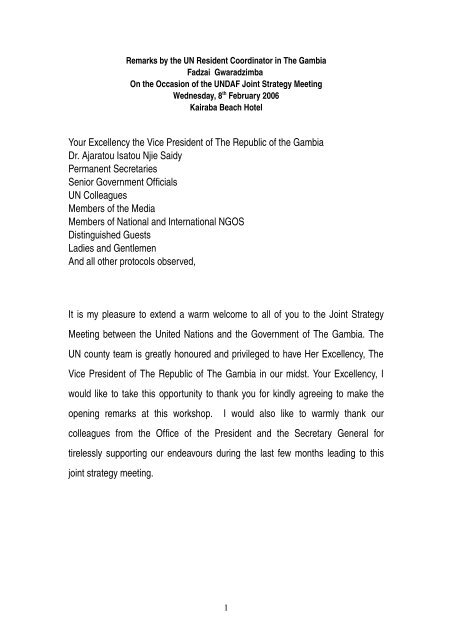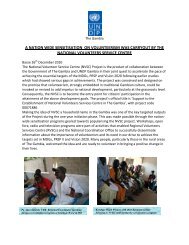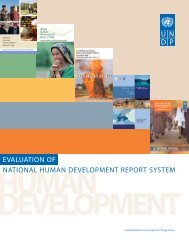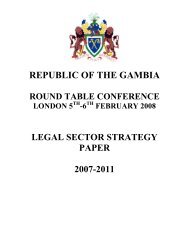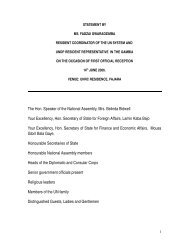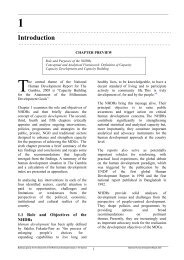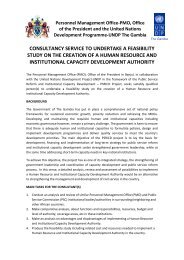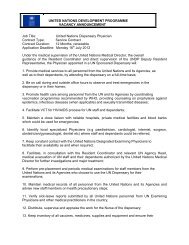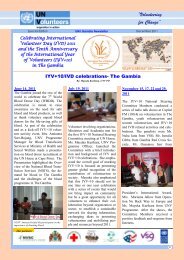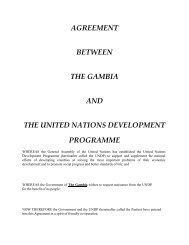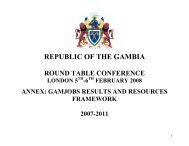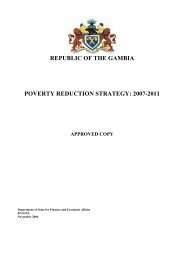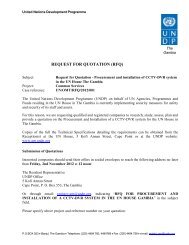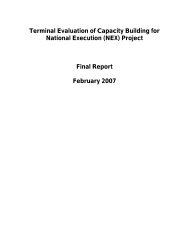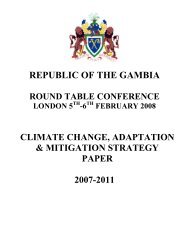Welcoming Remarks from the UN Resident Coordinator in The Gambi
Welcoming Remarks from the UN Resident Coordinator in The Gambi
Welcoming Remarks from the UN Resident Coordinator in The Gambi
You also want an ePaper? Increase the reach of your titles
YUMPU automatically turns print PDFs into web optimized ePapers that Google loves.
<strong>Remarks</strong> by <strong>the</strong> <strong>UN</strong> <strong>Resident</strong> <strong>Coord<strong>in</strong>ator</strong> <strong>in</strong> <strong>The</strong> <strong>Gambi</strong>a<br />
Fadzai Gwaradzimba<br />
On <strong>the</strong> Occasion of <strong>the</strong> <strong>UN</strong>DAF Jo<strong>in</strong>t Strategy Meet<strong>in</strong>g<br />
Wednesday, 8 th February 2006<br />
Kairaba Beach Hotel<br />
Your Excellency <strong>the</strong> Vice President of <strong>The</strong> Republic of <strong>the</strong> <strong>Gambi</strong>a<br />
Dr. Ajaratou Isatou Njie Saidy<br />
Permanent Secretaries<br />
Senior Government Officials<br />
<strong>UN</strong> Colleagues<br />
Members of <strong>the</strong> Media<br />
Members of National and International NGOS<br />
Dist<strong>in</strong>guished Guests<br />
Ladies and Gentlemen<br />
And all o<strong>the</strong>r protocols observed,<br />
It is my pleasure to extend a warm welcome to all of you to <strong>the</strong> Jo<strong>in</strong>t Strategy<br />
Meet<strong>in</strong>g between <strong>the</strong> United Nations and <strong>the</strong> Government of <strong>The</strong> <strong>Gambi</strong>a. <strong>The</strong><br />
<strong>UN</strong> county team is greatly honoured and privileged to have Her Excellency, <strong>The</strong><br />
Vice President of <strong>The</strong> Republic of <strong>The</strong> <strong>Gambi</strong>a <strong>in</strong> our midst. Your Excellency, I<br />
would like to take this opportunity to thank you for k<strong>in</strong>dly agree<strong>in</strong>g to make <strong>the</strong><br />
open<strong>in</strong>g remarks at this workshop. I would also like to warmly thank our<br />
colleagues <strong>from</strong> <strong>the</strong> Office of <strong>the</strong> President and <strong>the</strong> Secretary General for<br />
tirelessly support<strong>in</strong>g our endeavours dur<strong>in</strong>g <strong>the</strong> last few months lead<strong>in</strong>g to this<br />
jo<strong>in</strong>t strategy meet<strong>in</strong>g.<br />
1
Your Excellency,<br />
Dist<strong>in</strong>guished Guests,<br />
Ladies and Gentlemen,<br />
<strong>The</strong> purpose of this jo<strong>in</strong>t strategy meet<strong>in</strong>g is to def<strong>in</strong>e and clarify <strong>the</strong> <strong>UN</strong>’s<br />
strategic priorities <strong>in</strong> <strong>The</strong> <strong>Gambi</strong>a for <strong>the</strong> next five years as del<strong>in</strong>eated <strong>in</strong> <strong>the</strong><br />
United Nations Development Assistance Framework or <strong>UN</strong>DAF. Follow<strong>in</strong>g upon<br />
our validation workshop of yesterday, you will now have <strong>the</strong> opportunity to hear<br />
<strong>the</strong> different agencies present <strong>the</strong>ir draft programme strategies for 20072011 and<br />
how <strong>the</strong>se will respond to <strong>the</strong> priorities identified <strong>in</strong> <strong>the</strong> <strong>UN</strong>DAF. This workshop<br />
culm<strong>in</strong>ates a process of consultation that has been ongo<strong>in</strong>g for over one year and<br />
has <strong>in</strong>volved many of you present today. I am extremely grateful for <strong>the</strong><br />
commitment and <strong>in</strong>terest that <strong>the</strong> government counterparts have shown <strong>in</strong> <strong>the</strong><br />
<strong>UN</strong>DAF formulation process and hope that our collective efforts <strong>in</strong> jo<strong>in</strong>tly<br />
identify<strong>in</strong>g <strong>the</strong> key areas for <strong>UN</strong> support for <strong>the</strong> next five years will result <strong>in</strong> a<br />
stronger and results driven partnership between <strong>the</strong> government and <strong>the</strong> United<br />
Nations system.<br />
As most of you are aware, <strong>the</strong> <strong>UN</strong>DAF process is central to <strong>the</strong> <strong>UN</strong> reform, which<br />
calls for harmonization and alignment of <strong>UN</strong> procedures and programmes to achieve<br />
<strong>the</strong> Millennium Development Goals (MDGs). <strong>UN</strong> reform is not new. S<strong>in</strong>ce 1997, when<br />
<strong>the</strong> Secretary General called for a new bold frontier for <strong>the</strong> <strong>UN</strong> system and set up <strong>the</strong><br />
United Nations Development Group (<strong>UN</strong>DG), <strong>UN</strong> agencies have been steadily, if<br />
sometimes slowly, mov<strong>in</strong>g <strong>the</strong> harmonization and alignment agenda forward. Several<br />
goals underp<strong>in</strong> <strong>UN</strong> reform at <strong>the</strong> country level. I will mention but a few of <strong>the</strong>se:<br />
2
First, it seeks to place national priorities at <strong>the</strong> centre of development cooperation <strong>in</strong><br />
order to promote national ownership and development effectiveness of <strong>the</strong> country.<br />
In this respect, <strong>the</strong> <strong>UN</strong>DAF represents strong support for national priority sett<strong>in</strong>g and<br />
plann<strong>in</strong>g processes as it is firmly anchored <strong>in</strong> <strong>The</strong> <strong>Gambi</strong>a’s Vision 2020 and Poverty<br />
Reduction Strategies (PRSPII) and <strong>the</strong> Millennium Development Goals.<br />
Second, <strong>UN</strong> reform seeks to forge a results driven, coherent and transparent <strong>UN</strong><br />
response to national development challenges through a collaborative analysis of <strong>the</strong><br />
country situation (CCA), priority designation of roles based on <strong>the</strong> comparative<br />
advantage of each agency and <strong>the</strong> adoption of jo<strong>in</strong>t programmes and common<br />
monitor<strong>in</strong>g and evaluation framework. In <strong>the</strong> majority of countries as is <strong>in</strong> <strong>the</strong> case<br />
with <strong>The</strong> <strong>Gambi</strong>a, <strong>UN</strong>DP, <strong>UN</strong>FPA, <strong>UN</strong>ICEF and WFP (<strong>the</strong> Executive Committee<br />
Agencies) have synchronized <strong>the</strong>ir programm<strong>in</strong>g cycles, adopted harmonized cash<br />
transfer systems and launched jo<strong>in</strong>t programmes. We even have pilot jo<strong>in</strong>t offices <strong>in</strong><br />
countries such as Cape Verde. As our programme countries and donor partners<br />
cont<strong>in</strong>ue to push for greater alignment and coherence with<strong>in</strong> <strong>the</strong> <strong>UN</strong> system, we <strong>in</strong><br />
<strong>The</strong> <strong>Gambi</strong>a country office s<strong>in</strong>cerely hope that <strong>the</strong> present <strong>UN</strong>DAF will pave <strong>the</strong> way<br />
towards an even more unified <strong>UN</strong> response to national development priorities.<br />
Third, <strong>UN</strong> reform seeks to achieve greater impact and reduced transaction costs<br />
through common services and premises. In many countries such as <strong>The</strong> <strong>Gambi</strong>a, <strong>UN</strong><br />
agencies share services <strong>in</strong> diverse areas such as office space, security, travel<br />
bank<strong>in</strong>g and telecommunications. <strong>The</strong> <strong>UN</strong> presently shares a common <strong>UN</strong> House <strong>in</strong><br />
60 countries.<br />
<strong>The</strong> ultimate goal of all <strong>the</strong>se measures is to avoid duplication, reduce <strong>the</strong> burden on<br />
programme countries we serve and enhance <strong>the</strong> <strong>UN</strong> system’s contribution to<br />
3
development effectiveness at country level. In <strong>the</strong> f<strong>in</strong>al analysis, <strong>the</strong> role of <strong>the</strong> <strong>UN</strong> is<br />
to tackle <strong>the</strong> scourge of extreme poverty and <strong>in</strong>equality, make a difference <strong>in</strong> people<br />
’s lives, enlarge <strong>the</strong> <strong>in</strong>dividual’s opportunities and expand human capabilities through<br />
partnership with governments and national partners.<br />
<strong>The</strong> role of <strong>the</strong> <strong>UN</strong> as a trusted partner that promotes streng<strong>the</strong>n<strong>in</strong>g of national<br />
capacities to promote national ownership; a partner that acts as an honest broker to<br />
support countries <strong>in</strong> mobiliz<strong>in</strong>g and manag<strong>in</strong>g development assistance; as a<br />
convener that br<strong>in</strong>gs toge<strong>the</strong>r and promotes participation of all stakeholders <strong>in</strong><br />
national plann<strong>in</strong>g and as a n advocate for <strong>the</strong> MDGs and <strong>the</strong> protection and<br />
promotion of Human Rights is well known.<br />
What is perhaps less well known is how <strong>the</strong> <strong>UN</strong> works to achieve <strong>the</strong>se goals. <strong>The</strong><br />
<strong>UN</strong>DAF framework tries to br<strong>in</strong>g toge<strong>the</strong>r <strong>the</strong> complementarities and, <strong>in</strong>deed, <strong>the</strong><br />
complexities of <strong>the</strong> system toge<strong>the</strong>r.<br />
Your Excellency,<br />
Dist<strong>in</strong>guished Guests,<br />
Ladies and Gentlemen,<br />
<strong>The</strong> <strong>UN</strong>DAF has identified three broad areas of cooperation:<br />
1. Poverty Reduction and Social Protection<br />
2. Basic Social Services<br />
4
3. Governance and Human Rights.<br />
<strong>The</strong>se areas of cooperation have been fur<strong>the</strong>r def<strong>in</strong>ed <strong>in</strong>to specific outcomes that<br />
<strong>the</strong> <strong>UN</strong> and outputs will aim to achieve as well as <strong>the</strong> activities and partnership<br />
arrangements and resources required. By focus<strong>in</strong>g on specific areas of<br />
<strong>in</strong>terventions, <strong>the</strong> <strong>UN</strong>DAF will enable <strong>the</strong> United Nations system to collectively<br />
achieve <strong>the</strong> expected development outcomes.<br />
Your Excellency,<br />
In formulat<strong>in</strong>g <strong>the</strong> <strong>UN</strong>DAF, however, <strong>the</strong> <strong>UN</strong> is conscious that ultimately, <strong>the</strong><br />
achievement of national goals and targets as def<strong>in</strong>ed <strong>in</strong> <strong>the</strong> PRSP, and o<strong>the</strong>r<br />
plann<strong>in</strong>g tools, is <strong>the</strong> responsibility of <strong>the</strong> Government. <strong>The</strong> <strong>UN</strong>, like o<strong>the</strong>r<br />
development partners, can only facilitate <strong>the</strong> process and assist <strong>the</strong> Government <strong>in</strong><br />
its efforts to achieve its development targets. In this regard, <strong>the</strong> <strong>UN</strong>DAF must be<br />
seen as those choices that <strong>the</strong> <strong>UN</strong> has made to organize its contribution towards <strong>the</strong><br />
achievement of national priorities, based on its comparative advantage, available<br />
resources and mandates.<br />
<strong>The</strong> <strong>UN</strong>DAF must be seen as a <strong>UN</strong> strategy. It has direct l<strong>in</strong>ks to o<strong>the</strong>r analytical and<br />
strategic plann<strong>in</strong>g tools and processes at <strong>the</strong> countrylevel, and <strong>the</strong>re is need for <strong>the</strong><br />
<strong>UN</strong>DAF to be synchronized, whenever possible, with <strong>the</strong> national development<br />
plann<strong>in</strong>g cycle. In this regard, <strong>the</strong> <strong>UN</strong>DAF will contribute to and build upon o<strong>the</strong>r<br />
analytical and strategic plann<strong>in</strong>g processes and this should result <strong>in</strong> <strong>the</strong> reduction of<br />
transaction costs and duplication among processes of development analysis and<br />
plann<strong>in</strong>g.<br />
5
In implement<strong>in</strong>g <strong>the</strong> <strong>UN</strong>DAF, partnership is key. <strong>The</strong> <strong>UN</strong>’s primary strength is act<strong>in</strong>g<br />
<strong>in</strong> close partnership with government and o<strong>the</strong>r development actors, while at <strong>the</strong><br />
same time work<strong>in</strong>g towards <strong>the</strong> fulfilment of its role of promot<strong>in</strong>g <strong>the</strong> achievement of<br />
<strong>the</strong> <strong>in</strong>ternationally agreed goals and targets.<br />
We as a team will <strong>the</strong>refore, be look<strong>in</strong>g at Government to set priorities and provide<br />
leadership; at NGOs and Civil Society organizations to promote advocacy and<br />
outreach; at donors and <strong>the</strong> private sector to mobilise resources and provide<br />
expertise; at regional and subregional <strong>in</strong>stitutions to provide <strong>the</strong>ir unique<br />
perspectives and best practices; and at <strong>the</strong> media to promote public <strong>in</strong>formation.<br />
We hope that <strong>the</strong>se partnerships will result <strong>in</strong> greater impact on development<br />
results and development effectiveness.<br />
Your Excellency,<br />
Dist<strong>in</strong>guished Guests,<br />
Ladies and Gentlemen,<br />
It is my expressed hope that this first Jo<strong>in</strong>t Strategy Meet<strong>in</strong>g will not only achieves<br />
its specific goals to review <strong>the</strong> <strong>UN</strong>DAF Results Matrix and identify implementation<br />
strategies with government, implement<strong>in</strong>g M<strong>in</strong>istries and key nongovernmental<br />
partners.<br />
6
I also hope that this meet<strong>in</strong>g will represent <strong>the</strong> beg<strong>in</strong>n<strong>in</strong>g of a streng<strong>the</strong>ned and<br />
strategic work<strong>in</strong>g relationship with <strong>the</strong> Government and o<strong>the</strong>r partners that will<br />
<strong>in</strong>stitutionalise open l<strong>in</strong>es of communication among <strong>the</strong> various <strong>UN</strong> Agencies and<br />
partners; assist with identify<strong>in</strong>g new programm<strong>in</strong>g opportunities for <strong>the</strong> <strong>UN</strong><br />
System and keep<strong>in</strong>g <strong>the</strong> <strong>UN</strong> System’s assistance focussed on <strong>the</strong> results of <strong>the</strong><br />
agreed upon <strong>UN</strong>DAF matrix.<br />
Let me conclude by thank<strong>in</strong>g all of you for jo<strong>in</strong><strong>in</strong>g us today and wish<strong>in</strong>g you fruitful<br />
deliberations.<br />
I now have <strong>the</strong> s<strong>in</strong>gle honour to <strong>in</strong>vite Her Excellency <strong>The</strong> Vice President of <strong>the</strong><br />
Republic of <strong>the</strong> <strong>Gambi</strong>a to present her open<strong>in</strong>g remarks.<br />
Thank you for your attention.<br />
7


